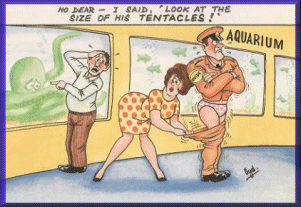Its a British thing....

I was going to post about British humour (with a U) but any how its morphed into a study of British idiosyncrasy.
Personal Space
1. British people like a lot of space around them.
2. They tend not to make physical contact of any kind with strangers and feel very uncomfortable if anyone stands too close to them. They will instinctively draw away if anyone comes too close.
Whenever I traveled on a bus in UK the British person next to me would draw away from me as if they were afraid of catching a disease or of the colour rubbing off my skin.(Kenyan student)
When I travelled on a train from Nairobi to Mombasa, a woman sat right next to me, her body touching mine. I was very nervous as I thought she must be making a sexual advance. (British woman in Kenya)
One example of the British "keeping their distance"is the infrequency with which people will shake hands with one another. British people do not shake hands with one another very often at all.
This is so true, we Brits hate to have to go and sit next to another (shock horror) person on the bus. We all perch on the edges of our seats least we end up actually touching another persons flesh.
Making Polite Requests
1. In making polite requests, British people tend to use very indirect language, using the conditional tense and negatives.
2. For instance,I don't suppose you could open the window, could you? Rather than Please open the window.
British people never get to the point. They go around this way and that way, using twenty words where three would do. It's really hard to communicate with them. (Israeli student)
Some nationalities do not always seem very polite;"I want this"or"I want that", no smiles nor a please nor a thank you. (British University Official)
Again so true, some people are worse then others of course. A friend I used to work with would take up to 45 minutes to tell a 5 minute tale. Which was bearable apart from the fact that I had to sit there while she re-told it to every one who happened to walk through our office door....
Please and Thank You
1. Please and thank you, are probably the three most important words in the British-English vocabulary.
2. British people are easily offended if the words are not used. In many languages and cultures such fundamental importance is not attached to these words; one can be perfectly polite without uttering them. In Britain almost the first words children are taught are please and thank-you (or thanks or ta).
3. What happens if you don't use them? In a hall of residence dining room, for example, if one says "Chips "or‘"Can I have chips?"or"Let me have some chips",the chips will almost certainly be served. However, the facial expression and body language of the person serving will give a clear indication that they are unhappy, offended or do not like dealing with this particular student. The student may see this negative reaction but not be aware what has gone wrong. S/he may see that staff are more friendly towards British students and may assume that staff simply do not like foreigners. It is far more likely that please and thank-you were omitted from the exchange and that the British person was reacting to this.
Once again totally true, nothing grinds on my nerves more then people not saying please and thank you. My husband seems to think its no big deal, perhaps it isn't here. Now I realise that I am british so it is instilled into my very being.
Greetings
As has already been said, British people do not shake hands very much. In Sheffield people may greet each other by smiling or saying "hallo"/"hi"/"are you all right?" etc, nodding or raising their eyebrows or, if they are close friends, hugging or kissing each other on the cheek(s). (Heterosexual British males usually do not hug, hold hands with or kiss other men.)
True, Wp said people here must think I am crazy when I ask them if they are alright as a greeting. meh oh well.....
Humour
1. Every culture has its own sense of humour, jokes and rules for establishing friendly communications. It is not possible to learn these quickly or easily.
2. British jokes and good humour rely heavily on a shared knowledge of British culture, politics, colloquial language, media and other areas which are unfamiliar to newcomers or even to some people who have been here for several years.
3. Informal relationships among British students and between British students and staff can therefore exclude many international students. Most British people do not realise at all that they are doing this.
‘The technicians started laughing and joking with the British students from the first day as if they were already friends. With us they seem cold and unfriendly. (Turkish student)
4. British humour also relies heavily on teasing or leg-pulling, as it is known. This can take the form of picking on aspects of an individuals personality and exaggerating them in fun.
5. Sarcasm and plays on words are also common.
6. British humour can seem offensive or insulting until you get used to it.
7. Try not to be offended; if you do find it difficult to tolerate, tell the person concerned that you feel very uncomfortable with his/her jokes.
8. Jokes about race, sexuality or gender are generally considered unacceptable.*
British humour is a tricky subject some people "get it" some don't. I myself can be quite "dry" at times and people tend to take me seriously. Its something I am working on but it just "slips" out at times. God help me when I finally get a job because I know I will do things as a practical joke etc that will be probably be frowned upon. I do practical jokes here in the house and they get me into So much trouble. Like the time I set the PC desktop background as the blue screen of death I nearly peed myself I thought it was that funny. Seems I got it totally wrong!
* that's news to me, and probably a lot of people. I think they only put that to keep in with the PC brigade. ;)
Labels: England





<< Main Page